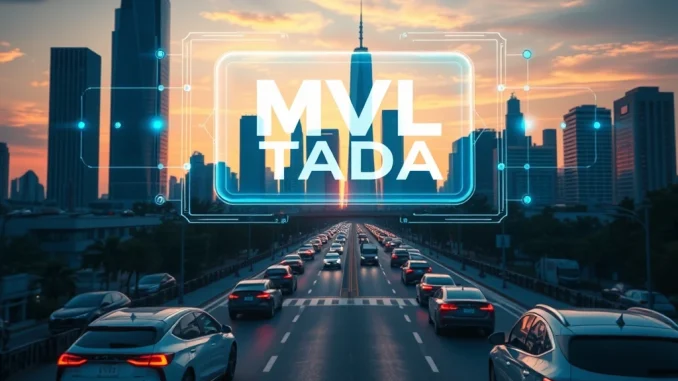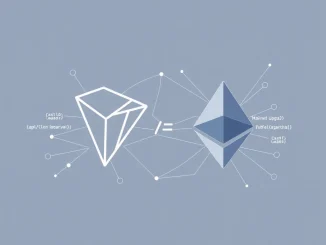
Exciting news for crypto enthusiasts and ride-sharing users alike! Blockchain innovator MVL is making a bold move into the US market, promising to disrupt the traditional ride-hailing landscape. Imagine a ride-sharing platform where drivers keep every penny they earn in fares – no commission taken by the platform. Sounds too good to be true? Well, MVL’s subsidiary, TADA, is bringing exactly that zero commission model to the United States, starting with Colorado. Let’s dive into how this groundbreaking initiative could reshape the future of urban mobility.
What is MVL and TADA? Exploring Blockchain Mobility
MVL, or Mass Vehicle Ledger, isn’t just another tech company; it’s a blockchain-based ecosystem dedicated to building a transparent and efficient mobility landscape. Think of it as a decentralized network designed to connect various aspects of the automotive industry, from vehicle data and lifecycle management to ride-sharing and beyond. At the heart of MVL’s vision is the belief that data generated by vehicles and mobility services should be owned and controlled by the participants, fostering a fairer and more sustainable system.
TADA is MVL’s ride-hailing service, embodying this very philosophy. Launched with the core principle of ‘zero commission,’ TADA distinguishes itself from giants like Uber and Lyft. In traditional ride-sharing models, drivers typically surrender a significant percentage of their earnings as commission to the platform. TADA flips this script entirely, allowing drivers to retain 100% of their fares. This driver-centric approach is not just a marketing gimmick; it’s a fundamental shift in how ride-sharing platforms can operate, potentially empowering drivers and improving the overall rider experience.
Zero Commission Ride-Sharing: A Revolutionary Model for Drivers and Riders
The concept of zero commission ride-sharing is truly transformative. Let’s break down why this model is so significant and how it benefits both drivers and riders:
- For Drivers: Increased Earnings and Empowerment: The most immediate benefit is a substantial increase in take-home pay. By eliminating commissions, drivers can earn significantly more for the same amount of work. This can lead to improved driver morale, reduced turnover, and a more stable and reliable driver pool. Imagine the financial difference for a driver working full-time – keeping 100% of their earnings can be life-changing. This financial empowerment can translate to better vehicle maintenance, improved personal well-being, and a more sustainable livelihood.
- For Riders: Potentially Lower Fares and Enhanced Service: While the primary focus of the zero-commission model is driver empowerment, riders can also benefit. With happier and more financially secure drivers, the quality of service can naturally improve. Furthermore, the reduced overhead for TADA, by not needing to manage complex commission structures, could potentially translate to more competitive fares for riders in the long run. It’s a win-win situation where driver satisfaction can indirectly lead to enhanced rider experiences.
- A Fairer Ecosystem: The zero-commission model promotes a fairer and more equitable ecosystem within the ride-sharing industry. It challenges the conventional model where platforms extract a significant portion of the value created by drivers. By prioritizing driver earnings, TADA is fostering a sense of partnership and shared prosperity, moving away from a purely transactional relationship.
US Expansion and the Colorado Drivers Cooperative: A Strategic Partnership
MVL’s decision to expand into the US market is a significant step in its global growth strategy. The US, being one of the largest ride-sharing markets in the world, presents both immense opportunities and considerable challenges. To navigate this complex landscape, MVL has strategically partnered with the Colorado Drivers Cooperative (DCC). This collaboration is crucial for several reasons:

- Local Expertise and Network: DCC brings invaluable local knowledge and a pre-existing network of drivers in Colorado. As a cooperative, DCC is deeply rooted in the driver community and understands the specific needs and challenges faced by drivers in the region. This local expertise is essential for a smooth and successful market entry.
- Shared Values and Mission Alignment: The partnership with DCC is not just a business transaction; it’s a collaboration based on shared values. DCC, being a cooperative, is inherently focused on the well-being of its driver members, mirroring TADA’s driver-centric philosophy. This alignment in mission and values strengthens the partnership and increases the likelihood of long-term success.
- Introduction of TADA’s Know-How: MVL, through TADA, will bring its technological expertise and operational know-how to the US market. This includes the platform technology, the zero-commission model implementation strategies, and best practices learned from its operations in other regions. Sharing this knowledge with DCC will empower the cooperative to effectively launch and manage the TADA service in Colorado.
Benefits of MVL TADA’s Zero Commission Model in the US Market
The introduction of TADA’s zero commission model in the US market holds immense potential benefits:
| Benefit | Description |
|---|---|
| Driver Attraction and Retention | The zero commission model is a powerful magnet for drivers, attracting those dissatisfied with the low earnings and high commission rates of existing platforms. It can significantly improve driver retention rates. |
| Competitive Advantage | TADA’s unique value proposition of zero commission sets it apart from competitors. It can attract both drivers and riders seeking a fairer and more transparent ride-sharing experience. |
| Positive Brand Image | By prioritizing driver earnings and fairness, TADA can build a strong and positive brand image, resonating with socially conscious consumers and drivers alike. |
| Innovation in Ride-Sharing | TADA is pushing the boundaries of the ride-sharing industry, demonstrating that alternative, more equitable models are not only possible but also viable. This can inspire further innovation and competition in the market. |
Challenges and Opportunities Ahead
While the prospects are thrilling, MVL and TADA will undoubtedly face challenges in the competitive US ride-sharing market. These may include:
- Competition from Established Giants: Uber and Lyft are deeply entrenched in the US market with massive resources and brand recognition. TADA will need to effectively differentiate itself and build market share.
- Regulatory Landscape: Ride-sharing regulations vary across states and cities in the US. Navigating this complex regulatory environment will be crucial for TADA’s expansion.
- Building Rider Awareness: Attracting riders to a new platform requires effective marketing and communication strategies to build awareness and trust.
However, these challenges are accompanied by significant opportunities:
- Growing Driver Dissatisfaction: There is increasing driver dissatisfaction with the commission-based models of existing platforms. TADA’s zero commission approach directly addresses this pain point, offering a compelling alternative.
- Demand for Fairer Services: Consumers are increasingly seeking out businesses that prioritize ethical practices and fairness. TADA’s driver-centric model aligns with this growing demand.
- Blockchain Technology Adoption: As blockchain technology gains wider acceptance, MVL’s blockchain-based platform can offer unique advantages in terms of transparency, security, and efficiency.
The Future of Ride-Sharing: Is Zero Commission the New Norm?
MVL’s US expansion with TADA’s zero commission model is more than just a business move; it’s a statement about the future of ride-sharing. It raises a critical question: Could zero commission models become the new norm in the industry? While it’s still early days, TADA’s initiative is undoubtedly shaking up the status quo and prompting a re-evaluation of traditional ride-sharing practices. The success of TADA in the US market could pave the way for wider adoption of fairer, driver-centric models globally, potentially leading to a more sustainable and equitable future for urban mobility.
Conclusion: A Bold Step Towards Driver Empowerment
MVL’s expansion into the US with TADA’s innovative zero commission ride-sharing model is a groundbreaking development in the cryptocurrency and mobility sectors. By partnering with the Colorado Drivers Cooperative, MVL is not just entering a new market; it’s championing a new paradigm for ride-sharing – one that prioritizes driver empowerment and fairness. As TADA takes to the streets of Colorado, it carries with it the potential to revolutionize the way we think about urban transportation and the role of blockchain in creating a more equitable and efficient world. Keep an eye on this space – the ride-sharing revolution powered by blockchain is just getting started!



